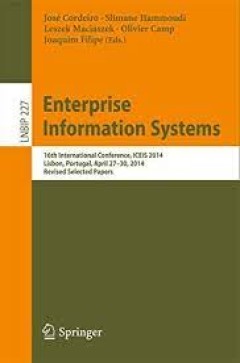Filter by

Enterprise Systems. Strategic, Organizational, and Technological Dimensions …
This book contains 15 thoroughly refereed research papers selected from 90 submissions for the 5th, 6th, and 7th International Workshop on Enterprise Systems, Pre-ICIS 2010–2012, held in St. Louis, MO, USA, in December 2010, in Shanghai, China, in December 2011, and in Orlando, FL, USA, in December 2012, respectively. In addition, two invited papers complete this volume. The contributions …
- Edition
- -
- ISBN/ISSN
- 978-3-319-17587-4
- Collation
- 74 b/w illustrations
- Series Title
- -
- Call Number
- -

Enterprise Interoperability 6th International IFIP Working Conference, IWEI …
This book constitutes the proceedings of the 6th International IFIP Working Conference on Enterprise Interoperability, IWEI 2015, held in Nîmes, France, in May 2015. The event was organized by the IFIP Working Group 5.8 on Enterprise Interoperability in co-operation with INTEROP-VLab and PGSO (Pole Grand Sud Ouest) from INTEROP-Vlab. The theme for IWEI 2015 was “From Enterprise Interoperabil…
- Edition
- -
- ISBN/ISSN
- 978-3-662-47157-9
- Collation
- 73 b/w illustrations
- Series Title
- -
- Call Number
- -

Enterprise Information Systems 17th International Conference, ICEIS 2015, Ba…
This book contains revised papers from the 17th International Conference on Enterprise Information Systems, ICEIS 2015, held in Barcelona, Spain, in April 2015. The 31 papers presented in this volume were carefully reviewed and selected from a total of 327 submissions. The book also contains one full-paper invited talk. The selected papers reflect state-of-the-art research that is oriented …
- Edition
- -
- ISBN/ISSN
- 978-3-319-29133-8
- Collation
- 263 illustrations in colour
- Series Title
- -
- Call Number
- -

Enterprise Information Systems 16th International Conference, ICEIS 2014, Li…
This book contains extended and revised papers from the 16th International Conference on Enterprise Information Systems, ICEIS 2014, held in Lisbon, Portugal, in April 2014. The 24 papers presented in this volume were carefully reviewed and selected from a total of 313 submissions. The book also contains two full-paper invited talks. The selected papers reflect state-of-the-art research that…
- Edition
- -
- ISBN/ISSN
- 978-3-319-22348-3
- Collation
- 178 b/w illustrations
- Series Title
- -
- Call Number
- -

Enterprise Governance of Information Technology Achieving Alignment and Valu…
Featuring numerous case examples from companies around the world, this second edition integrates theoretical advances and empirical data with practical applications, including in-depth discussion on the COBIT 5 framework which can be used to build, measure and audit enterprise governance of IT approaches. At the forefront of the field, the authors of this volume draw from years of research and …
- Edition
- -
- ISBN/ISSN
- 978-3-319-14547-1
- Collation
- 56 b/w illustrations, 60 illustrations in colour
- Series Title
- -
- Call Number
- -

Enterprise Applications and Services in the Finance Industry 7th Internation…
This book constitutes the proceedings of the 7th International Workshop on Enterprise Applications and Services in the Finance Industry, FinanceCom 2014, held in Sydney, Australia, on December 12, 2014. The workshop spans multiple disciplines, including technical, service, economic, sociological, and behavioral sciences. It reflects on technologically enabled opportunities, implications, and…
- Edition
- -
- ISBN/ISSN
- 978-3-319-28151-3
- Collation
- 29 b/w illustrations
- Series Title
- -
- Call Number
- -

Outside Director Compensation in German Public Family Firms : An Empirical An…
Pascal Engel investigates how outside directors are incentivized in family firms that are publicly listed but still partly owned by members of the founding family. Owning families significantly influence their firms' corporate conduct with their own set of goals, sometimes in conflict with economically driven goals of the capital markets. The author analyzes how family shareholders exert their …
- Edition
- -
- ISBN/ISSN
- 978-3-658-07316-9
- Collation
- -
- Series Title
- Familienunternehmen und KMU
- Call Number
- 338.7 ENG o

Time Series Analysis and Forecasting
This volume presents selected peer-reviewed contributions from The International Work-Conference on Time Series, ITISE 2015, held in Granada, Spain, July 1-3, 2015. It discusses topics in time series analysis and forecasting, advanced methods and online learning in time series, high-dimensional and complex/big data time series as well as forecasting in real problems. The International Work-C…
- Edition
- -
- ISBN/ISSN
- 978-3-319-28725-6
- Collation
- 63 b/w illustrations, 49 illustrations in colour
- Series Title
- -
- Call Number
- -

Engineering Mathematics II Algebraic, Stochastic and Analysis Structures for…
This book highlights the latest advances in engineering mathematics with a main focus on the mathematical models, structures, concepts, problems and computational methods and algorithms most relevant for applications in modern technologies and engineering. It addresses mathematical methods of algebra, applied matrix analysis, operator analysis, probability theory and stochastic processes, geome…
- Edition
- -
- ISBN/ISSN
- 978-3-319-42105-6
- Collation
- 20 b/w illustrations, 26 illustrations in colour
- Series Title
- -
- Call Number
- -

Engineering Mathematics I Electromagnetics, Fluid Mechanics, Material Physic…
This book highlights the latest advances in engineering mathematics with a main focus on the mathematical models, structures, concepts, problems and computational methods and algorithms most relevant for applications in modern technologies and engineering. In particular, it features mathematical methods and models of applied analysis, probability theory, differential equations, tensor analysis …
- Edition
- -
- ISBN/ISSN
- 978-3-319-42082-0
- Collation
- 68 b/w illustrations, 67 illustrations in colour
- Series Title
- -
- Call Number
- -
 Computer Science, Information & General Works
Computer Science, Information & General Works  Philosophy & Psychology
Philosophy & Psychology  Religion
Religion  Social Sciences
Social Sciences  Language
Language  Pure Science
Pure Science  Applied Sciences
Applied Sciences  Art & Recreation
Art & Recreation  Literature
Literature  History & Geography
History & Geography